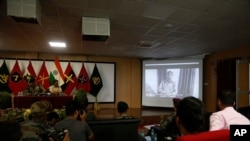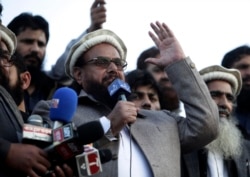Four top leaders of a Pakistan-based proscribed extremist militant group linked to deadly attacks in neighboring India have been convicted of terrorism funding.
A special court in the eastern city of Lahore on Thursday found the four guilty of collecting funds and unlawfully financing activities of the Lashkar-e-Taiba (LeT) organization.
LeT has been banned in Pakistan since 2002. Indian and U.S. officials blame the organization for plotting the 2008 terror strikes on Mumbai that killed 166 people.
The Punjab provincial counterterrorism department, which investigated and instituted the legal proceedings, identified the men as Zafar Iqbal, Yahya Aziz, Abdul Rehman Makki and Abdus Salam.
'Major role' in halting financing
It said in a post-verdict statement that Iqbal and Aziz had been each sentenced to five years in prison while the other two had been given one-year jail terms each.
"Their conviction will play a major role in checking terrorism financing in Pakistan,” the counterterrorism department said.
The statement noted that three of the convicts, Iqbal, Aziz and Salam, were also on a U.N. list of designated terrorists.
An anti-terrorism court in Lahore earlier this year handed down two 5½-year prison sentences to the founder of LeT, Hafiz Saeed, for his links with the banned group and for collecting money to fund terrorism.
Saeed, designated a global terrorist by both the United States and the U.N, founded LeT in the 1990s but has distanced himself from the group since Pakistani authorities outlawed it.
The cleric also denies allegations he masterminded the Mumbai attacks or any other subversive acts in India.
Washington has offered a $10 million reward for bringing Saeed to justice. Several of his aides are also currently on trial in Pakistan in terrorism-related cases.
Pakistan has been under growing international pressure, particularly from the U.S., to crack down on militant groups operating in the country in the name of Islamic charities.
FATF pressure
The Paris-based Financial Action Task Force placed Pakistan two years ago on its “grey list” of countries with inadequate controls over money laundering and terrorism financing.
The global watchdog has been pressing the country to improve its efforts against terrorism. It has given Pakistan a 27-point action program to avoid being placed on FATF’s blacklist, which would make international dealings almost impossible for Islamabad.
Pakistani Minister for Industries Hammad Azhar told the national parliament last week that the government over the past year had “fully implemented” 14 tasks outlined in the FATF program and “partially acted” on 11 others. He said maximum efforts were being made to implement the remaining two points but did not elaborate.
Pakistan has consistently denied U.S. and Indian allegations that it harbors and supports Islamist militants, including those blamed for attacks in neighboring Afghanistan.
Washington has, however, lately praised Islamabad’s counterterrorism measures, particularly the country’s cooperation in facilitating a negotiated settlement to the Afghan conflict.
Support at financial institutions
U.S. officials admit Pakistani efforts have won Washington’s crucial backing at global financial institutions, such as the International Monetary Fund, in order to borrow much-needed funding for the country’s struggling economy.
Pakistani officials say U.S. support also played a role in securing much-needed relief from FATF to fully implement its financial sector reforms.
Alice Wells, who retired last month from the U.S. State Department as principal deputy assistant secretary of state for South and Central Asia, hailed Pakistan’s prosecution and conviction of Saeed. “I don’t term these steps irreversible, but they are important steps,” Wells told a seminar just days before ending her career.





